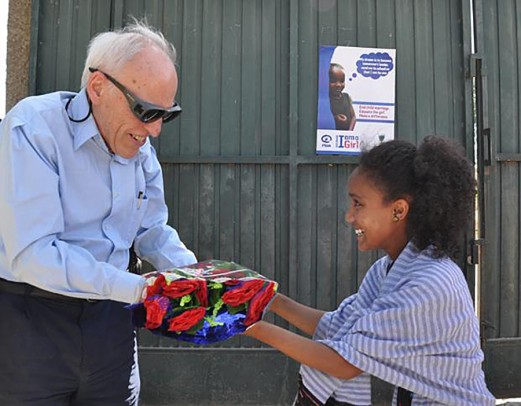Retired history professor supports children in Africa

John Kulczycki is welcomed at Gelan Gura School in Ethiopia, a Plan International School. Kulczycki, professor emeritus of history, has sponsored children from Africa for the past 35 years.
John Kulczycki and his wife have no children of their own, but they’ve been sponsoring boys and girls — six so far — for 35 years.
All the kids are from Africa, with the $30-per-month sponsorships lasting from one to 12 years. First was Elsadig Ali of Sudan, followed by Ahmed Mohamed, also of Sudan, Norest Mandimandi of Zimbabwe, Anne Marie Awoh of Cameroon, Rouguiyatou Ka of Senegal and, beginning in May, Semira Abidurezake Shifa of Ethiopia.
Kulczycki (pronounced kul-CHIT-ski), emeritus professor of history, works with Plan International USA, which helps children from 49 countries.
On a recent visit to a Plan International school in Ethiopia, he was asked by a social worker how many children he has. When he said none, she responded, “These are your children.”
“I have accepted this mandate and still choke up when I think of it,” he said.
At another school, “I was greeted by groups of students singing, dancing, rhythmically clapping, and even ululating as if I were as some kind of dignitary and honored guest,” he said.
“I was somewhat embarrassed and uncomfortable — I had come to observe and learn, not to be celebrated. It was nevertheless a pleasant surprise.”
During another stop, Kulczycki saw a World Book Encyclopedia in the library. “I pulled a volume off the shelf and immodestly showed the entry on Kosciuszko over my name.”
Polish history is his specialty. Tadeusz Kosciuszko was a colonel who fought on the American side in the Revolutionary War and later led a rebellion against Russian domination in Poland.
Peace Corps volunteer in Ethiopia
The Wolaitta Development Association runs a school for vulnerable children in Ethiopia; Kulczycki has sponsored two projects supporting girls here.
He first visited Ethiopia as a Peace Corps volunteer when he was 22. “I developed an affection for the country and its people,” he said. He and his wife also visited there 11 years ago.
Most of the children they sponsor are girls, because they take a special interest in the barriers to education the girls face.
Many girls drop out of school when they reach puberty. “They miss school when they have their periods, because most schools in the countryside have no latrines, and they become embarrassed,” he said.
Early marriages are common as a way of protecting girls’ virginity, he added. “Or a girlfriend gets married, and there is peer pressure.”
Why is he an international sponsor?
“This country does too little in the area of foreign aid,” replied Kulczycki. “We’re a very rich country. There are people who say there are kids who need help in Chicago, and this country has an obligation to take care of its own, but I tend to concentrate my charitable efforts in foreign countries.”
He kept an international focus while teaching at UIC, where he was a faculty member from 1978 to 2002.
“I got to know Japanese scholars who specialized in Eastern Europe or Poland, and gave lectures in Japan on Polish history,” Kulczycki said.
He was the primary contact when a number of UIC students studied in Japan on scholarships, “and I promoted international studies among my students,” he said.
Kulczycki grew up in Milwaukee. He earned a bachelor’s degree at the College of Holy Cross in Worcester, Massachusetts, spending his junior year at the University of Vienna.
“That was an eye-opener, living abroad, on your own,” he said.
He served in the Peace Corps before going to Columbia University, where he received a master’s and Ph.D.
Few colleges offered courses in Polish history then and Kulczycki could find only part-time or temporary positions before there finally was an opening at UIC. “A friend told me it was the only job in the field in the previous five years,” he said. “I was the first person to teach Polish history at UIC.”
In retirement he attends the theater, subscribes to the Chicago Symphony, Art Institute and Museum of Contemporary Art, and takes in jazz performances.
He lives in Lincoln Park with his wife, Regina Bowgierd, a retired psychiatrist.
“We met when I was studying in Poland. I spirited her past the Iron Curtain,” he said. At the time, people in Poland were allowed to travel only on the invitation of someone in the destination country. Kulczycki had a cousin in France and they were married there.
They booked a flight to the U.S. from Luxembourg, but his wife’s passport wasn’t good in that country. He quickly placed his American passport on top of hers as a border agent approached.
“He walked right by,” Kulczycki said.
